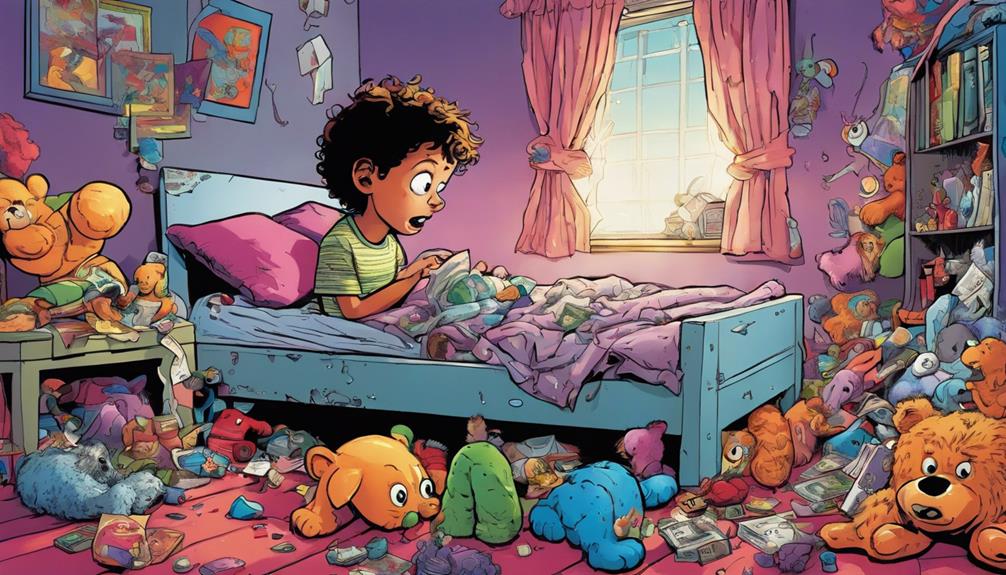The Tooth Fairy often wishes she could change her approach to rewards. She regrets giving in to kids' soaring expectations, which creates rivalry among siblings. A fair payout system based on honesty could've minimized jealousy. She's learned that the magic of losing a tooth shouldn't hinge on competition or extravagant rewards. Promoting integrity over trickery is vital; after all, lying about tooth loss leaves nothing under the pillow. The Tooth Fairy wishes she could encourage sharing and teamwork among siblings instead. Want to hear more about her lessons learned and how you can benefit from them?
Key Takeaways
- The Tooth Fairy wishes she could set clearer guidelines to prevent excessive reward expectations among children influenced by social media and peers.
- She regrets not fostering open discussions about honesty, leading to disappointment for those who deceive about losing teeth.
- The Tooth Fairy acknowledges that variability in payouts has caused sibling rivalry and jealousy, complicating family dynamics.
- She wishes to reinforce the importance of integrity, emphasizing that authentic lost teeth yield greater rewards than self-pulled ones.
Tooth Fairy's Generosity Dilemma
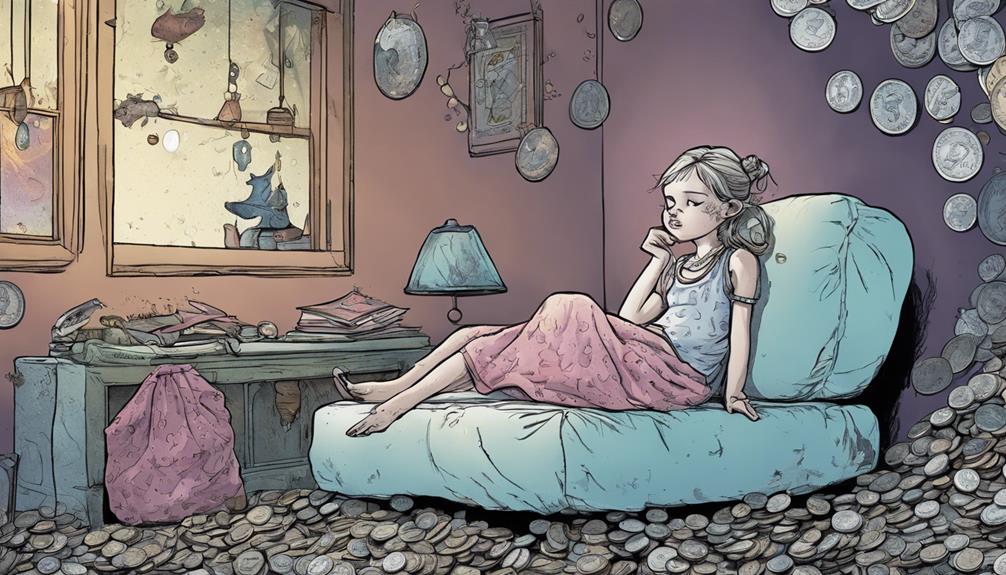
The Tooth Fairy faces a tricky challenge balancing her image of generosity with the rising expectations of children who hear about bigger payouts from friends and social media. When you lose a tooth, you're excited to see what she'll leave under your pillow, but lately, those expectations have skyrocketed. Some kids are sharing stories of receiving extravagant amounts, leaving others wondering why their Tooth Fairy isn't as generous.
Parents often feel the pressure, too. They worry about setting a precedent for excessive rewards, fearing it might spoil you or create envy among your friends. The Tooth Fairy's dilemma lies in wanting to reward you fairly without promoting unrealistic expectations. She understands how thrilling it's to find a surprise, but she also knows that a few dollars can go a long way in teaching the value of money.
As she navigates this tricky terrain, the Tooth Fairy must consider her role carefully. After all, she wants you to cherish the magic of losing a tooth without getting caught up in the competition of who gets the biggest payout. Finding that balance is her constant challenge. She has to decide how much to leave under the pillow without creating unrealistic expectations for parents. And of course, she must also account for the tooth fairy’s mishaps, like forgetting to come on certain nights or accidentally waking the children. It’s a tough job, but someone has to do it!
Misguided Tooth Extraction Adventures

Children's creative, yet misguided, attempts to extract loose teeth often lead to amusing, and sometimes concerning, dental adventures. You may have witnessed friends trying unconventional methods to yank out their teeth, driven by the promise of a reward from the tooth fairy. These escapades can spiral into chaos, as kids sometimes resort to wild tactics, risking their dental health.
Here are some common misguided extraction methods:
- Sticky Treats: Kids munch on chewy candies, hoping the tooth will come loose, often resulting in more than just a sore jaw.
- Team Efforts: Groups of friends organize tooth removal parties, filled with laughter, but often lead to failed attempts and more loose teeth.
- DIY Tools: Imaginative solutions, like using a hammer, highlight the extreme lengths some will go to for that cash under the pillow.
These adventures teach important lessons about honesty and responsibility, reminding you that a genuine tooth under your pillow is the best way to guarantee the tooth fairy pays a visit.
Covering Up Tooth Extraction Fails

Covering up tooth extraction fails often leads to creative schemes that spark both hilarity and chaos among friends. You might find yourself in the middle of a tooth extraction attempt, armed with a rubber band and an apple, only to realize the tooth is still firmly in place. In those moments, the pressure mounts, and you and your friends come up with elaborate plans to hide your failed attempts.
You split up to conceal traces of your actions, perhaps stashing the rubber band in a secret spot or pretending to be casually munching on that apple. The playful banter keeps the mood light, but deep down, you feel the urgency to score that coveted Tooth Fairy payout.
As the night goes on, some of you might resort to leaving a fake tooth under your pillow, hoping to trick the Tooth Fairy. But if she catches on, you're left with disappointment and possibly a hefty increase in chores as a consequence.
Ultimately, these escapades highlight how much you value those rewards, sometimes leading you to prioritize quick gains over honesty, and leaving you to wonder if the Tooth Fairy's patience has its limits.
Lessons From Cheating Consequences
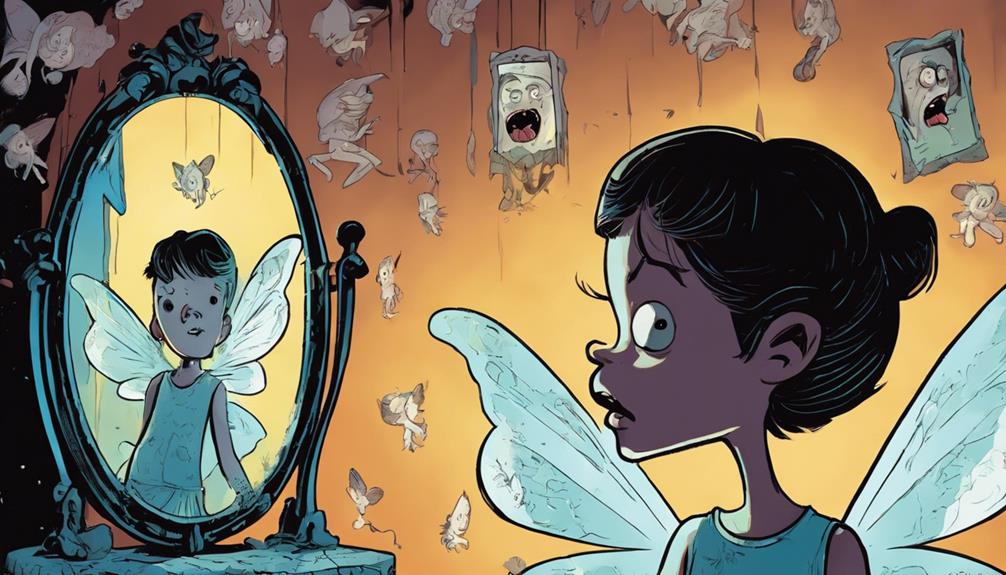
Leaving a fake tooth under your pillow might seem like a clever trick, but it often leads to lessons about the consequences of cheating that you won't soon forget. The disappointment of discovering that your deception has backfired can be a harsh reality. When you cheat, you risk not only the reward but also trust and integrity.
Here are some key lessons from the consequences of cheating:
- Deception leads to disappointment: Finding a fake tooth under your pillow reminds you that dishonesty often results in regret.
- Shortcuts can create more challenges: Cheating to gain rewards might seem appealing, but it can lead to chores or restrictions that are far more burdensome.
- Integrity nurtures relationships: The Tooth Fairy's warning about potential future visits emphasizes the need for honesty to maintain positive interactions.
Ultimately, the excitement of potential rewards must always be balanced with respect for the established mythos and a commitment to honesty.
Sibling Rivalry Over Tooth Money
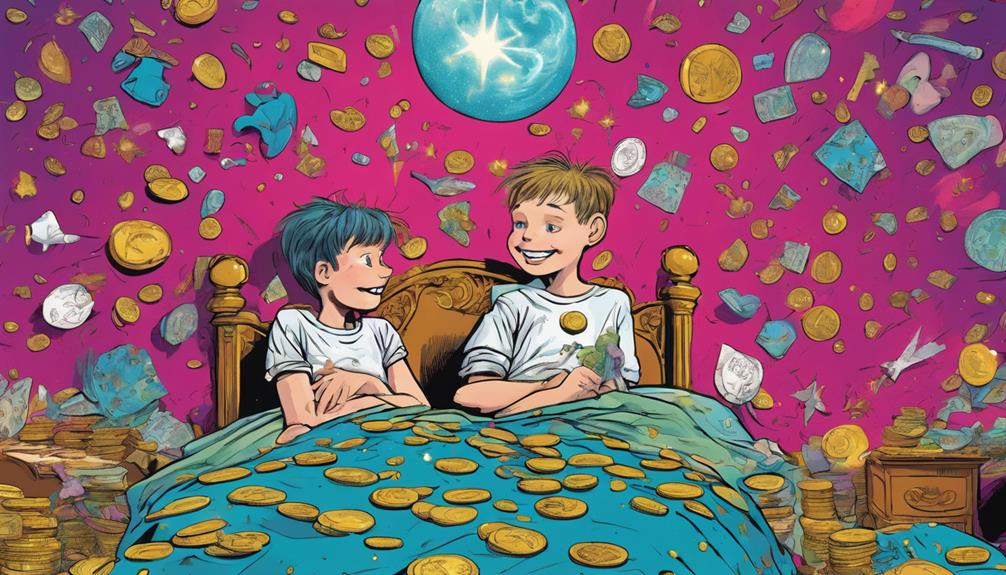
When you and your siblings start losing teeth, the competition for tooth fairy rewards kicks in.
You might find yourselves negotiating over who deserves more money, while also hatching clever plans to make the most out of the situation.
This rivalry can teach you important lessons about fairness and sharing, especially when parents step in to help settle disputes.
Competition for Tooth Rewards
Sibling rivalry often flares up as kids compete for the Tooth Fairy's monetary rewards, leading to heated negotiations over how much each lost tooth is worth. This competition can create a minefield of tension among siblings, especially when the Tooth Fairy's generosity varies from one child to another.
You might notice your kids engaging in some amusing yet strategic antics, such as:
- Hiding teeth so the Tooth Fairy thinks they've lost more.
- Swapping teeth with each other to boost their payouts.
- Bargaining for higher rewards based on the perceived value of their lost teeth.
As a parent, you play an essential role in managing this rivalry. Setting clear rules can help guarantee fairness and minimize disputes.
However, the introduction of foreign exchange students or new family members can complicate matters even further. Ultimately, the Tooth Fairy might wish she could standardize her payouts to avoid the sibling squabbles and keep the peace.
After all, it's all about the magic and joy of losing a tooth, not the monetary competition!
Negotiating Fair Payouts
Negotiating fair payouts for lost teeth often becomes a tricky balancing act, especially as kids compare notes on their Tooth Fairy experiences. Sibling rivalry can escalate when one child hears about the larger rewards their friends received, leading to jealousy or a sense of entitlement. As a parent, you might find yourself mediating disputes over who deserves more for their lost tooth.
Age plays a role in these negotiations, with older siblings sometimes cashing in on bigger payouts due to their longer history of losing teeth. This can create tension, as younger siblings may feel shortchanged. To ease the situation, consider implementing a system where payouts are based on the condition of the tooth. This way, siblings can understand the criteria for rewards, reducing the chances of conflict.
Ultimately, your guidance is vital in setting fair expectations. By encouraging open discussions about payouts and creating a sense of fairness, you help maintain harmony among siblings. The Tooth Fairy might wish she could intervene directly, but with your support, kids can learn valuable lessons about negotiation and equity, making the experience more enjoyable for everyone involved.
Strategies for Sharing Money
Finding ways to share Tooth Fairy money can help reduce rivalry and foster a sense of teamwork among siblings. When children perceive fairness in how they receive and share their rewards, it creates a more harmonious environment.
Here are some effective strategies you can implement:
- Set Clear Guidelines: Establish equal payout rules based on age or the number of teeth lost, so everyone knows what to expect.
- Pool Funds for Family Activities: Encourage siblings to combine their Tooth Fairy money for a fun family outing or treat, promoting cooperation over competition.
- Discuss Fairness: Have open conversations about honesty and fairness. This helps kids understand that trying to manipulate the Tooth Fairy isn't worth the extra stress.
Parent Involvement and Oversight

When it comes to the tooth fairy, your communication with your kids is key.
You need to set clear expectations about what happens when they lose a tooth and keep an eye on how they handle the situation.
Importance of Communication
Effective communication between you and your child about the tooth fairy can build trust and minimize disappointment during this exciting milestone. When you discuss the tooth fairy openly, it sets the stage for a more enjoyable experience. Additionally, your involvement can help your child understand the importance of honesty regarding lost teeth.
Here are a few key points to reflect on:
- Foster Honesty: Encourage your child to be truthful about how they lose their teeth, ensuring they know the tooth fairy values authenticity.
- Address Dental Health: Discuss any concerns about dental practices, especially if your child tries to pull teeth themselves for rewards.
- Strengthen Family Bonds: Use this magical experience to create playful interactions that enhance your family dynamics and build cherished memories.
Setting Clear Expectations
Establishing clear expectations around the tooth fairy's rewards helps prevent misunderstandings and guarantees your child feels valued during this exciting rite of passage.
By discussing what your family considers a reasonable payout for lost teeth, you can align this with your values and financial situation. This way, your child won't be surprised or disappointed when they find a different amount than they anticipated.
Encouraging open conversations about honesty is vital too. When kids understand that deceitful tactics, like hiding fake teeth, won't lead to more money, they're less likely to engage in such behavior.
Regular family discussions about dental health help children grasp the natural timeline for losing teeth, reducing frustration and unrealistic expectations.
Moreover, your involvement in explaining the magic of the tooth fairy can enhance the experience, minimizing sibling rivalry or conflicts over rewards.
Setting these clear expectations isn't just about money; it's about fostering trust and understanding within your family.
Monitoring Tooth Loss
Tooth loss can be an exciting time for kids, but your involvement in monitoring this process guarantees they handle it safely and honestly. The Tooth Fairy often wishes for more parental supervision to prevent children from trying to extract teeth prematurely or dishonestly. By staying engaged, you can help your child navigate this milestone without dental health issues.
Here are some ways you can support your child during this time:
- Regular Check-ins: Frequently examine your child's loose teeth and provide guidance on how to extract them safely.
- Discuss Honesty: Talk about the importance of genuine tooth loss, so they understand that the Tooth Fairy rewards honesty.
- Track Milestones: Establish a routine for tracking tooth loss, making it easier to prepare for the Tooth Fairy's visits.
Impact of Foreign Exchange Students
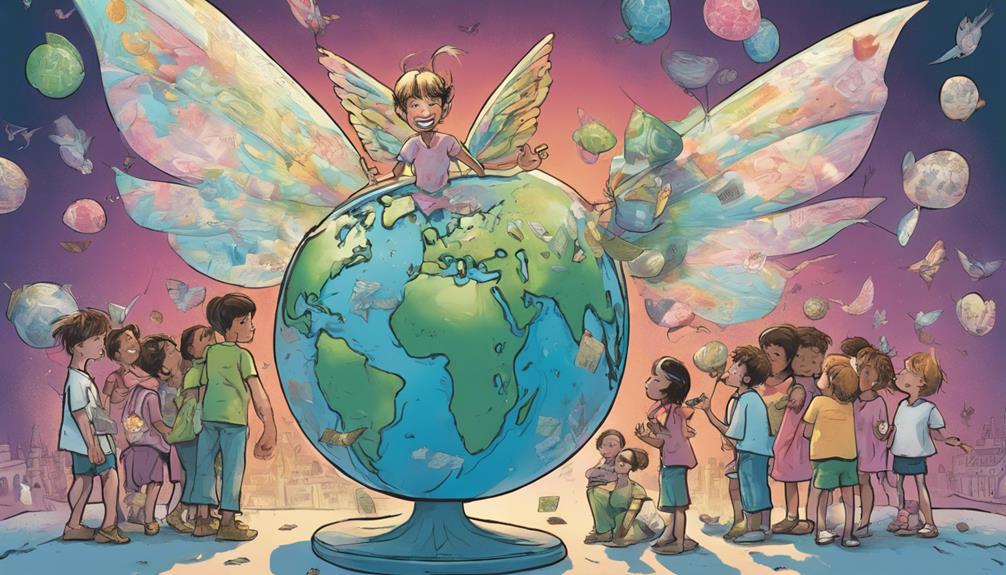
Hosting foreign exchange students can stir up a lively mix of cultural beliefs and family dynamics, especially when it comes to traditions like the tooth fairy. You might notice that your own kids suddenly feel competitive about who gets more from the tooth fairy, especially when they see how their new friend's culture handles lost teeth.
As that foreign exchange student shares their customs, you may find your family in amusing debates about what the tooth fairy should actually deliver. While your kids might expect a few coins, the exchange student might have different ideas, leading to playful negotiations about how much a lost tooth is worth.
The excitement of having a new friend around can distract your children from focusing on their tooth-loss milestones, making those moments feel less significant. You'll probably find humor in the contrasting views, but it can also create confusion about expectations.
Ultimately, hosting an exchange student can enrich your family's understanding of traditions but might leave you pondering what the tooth fairy could do differently to harmonize these diverse customs. It's an intricate dance of beliefs that can change the very nature of tooth fairy magic.
Encouraging Honesty and Integrity

When you teach kids the value of truthfulness, you're laying the foundation for integrity that lasts a lifetime.
They'll learn that deceit can lead to disappointment, not just from the Tooth Fairy but in life as well.
Value of Truthfulness
Honesty is key to building trust and reaping genuine rewards, as the Tooth Fairy demonstrates with her emphasis on integrity. When you're truthful about your lost teeth, you not only gain a better payout but also learn important life lessons. The Tooth Fairy's experience teaches that sincerity fosters positive relationships and enriches your interactions.
Here's how valuing truthfulness can benefit you:
- Better Rewards: Authentic lost teeth earn greater payouts than fake ones, showing the tangible benefits of honesty.
- Life Lessons: By being truthful, you cultivate accountability, which is essential as you grow.
- Trust Building: Honesty leads to strong relationships, as people are more likely to trust you when they know you're sincere.
The Tooth Fairy's regrets about deceitful tricks remind us that honesty shapes our character and opens doors to rewarding experiences. By embracing truthfulness, you not only bring joy to others but also enrich your own life with the values of honesty and integrity.
Consequences of Deceit
Deceit can lead to disappointing outcomes, like the Tooth Fairy's dismay upon finding fake teeth, which serves as a reminder that honesty is the best policy for receiving rewards. When kids try to fool her, they often face consequences that extend beyond a simple lost visit. Instead of receiving a reward, they might find themselves completing extra chores as a lesson in accountability.
Understanding the value of integrity is essential for forming a positive relationship with the Tooth Fairy. Here's a quick look at the effects of deceit:
| Action | Immediate Consequence | Long-term Impact |
|---|---|---|
| Lying about teeth | No reward from Tooth Fairy | Erosion of trust |
| Finding fake teeth | Disappointment for everyone | Missed opportunities for rewards |
| Embracing honesty | Generous surprises | Stronger values of integrity |
Encouraging honesty not only helps you enjoy delightful visits from the Tooth Fairy but also instills important life lessons about being truthful. Embracing integrity now sets the foundation for a trustworthy future.
Building Trustworthiness Early
Building trustworthiness starts early, and encouraging kids to be truthful about their lost teeth lays a strong foundation for integrity. When children understand the importance of honesty, they not only enhance their own character but also enrich the magical moments surrounding tooth loss.
The Tooth Fairy's disappointment in finding a fake tooth under a pillow serves as a reminder that honesty is essential in maintaining these cherished traditions.
To foster a sense of integrity, consider these strategies:
- Model honesty: Demonstrate truthful behavior in your daily life, showing that integrity is valued.
- Create a safe space: Encourage open conversations where kids feel secure sharing their thoughts without fear of judgment.
- Reward genuine actions: Reinforce the idea that real rewards come from honest behavior, not deceitful tricks.
Promoting Sharing Among Siblings

During those magical moments when a tooth is lost, fostering a spirit of sharing among siblings can turn competition into cooperation. The Tooth Fairy often wishes she had encouraged this spirit, as sibling rivalry can lead to disputes over the money received for lost teeth. By promoting sharing, you can create teamwork, making the tooth-losing experience a bonding opportunity rather than a contest.
Here's how sharing can impact your family dynamics:
| Benefits of Sharing | Ways to Encourage Sharing |
|---|---|
| Develops social skills | Host a tooth-loss celebration |
| Boosts emotional intelligence | Create a sharing chart |
| Strengthens sibling relationships | Introduce a 'sharing bonus' |
| Encourages teamwork | Reward cooperative behavior |
Instilling the value of sharing from a young age leads to a lifetime of cooperation. The Tooth Fairy regrets not emphasizing this lesson in her visits. Imagine if she had introduced a 'sharing bonus' for siblings who supported each other! Such efforts could enhance family bonds and create cherished memories, making the tooth fairy experience even more magical.
Reflecting on Tooth Fairy Traditions
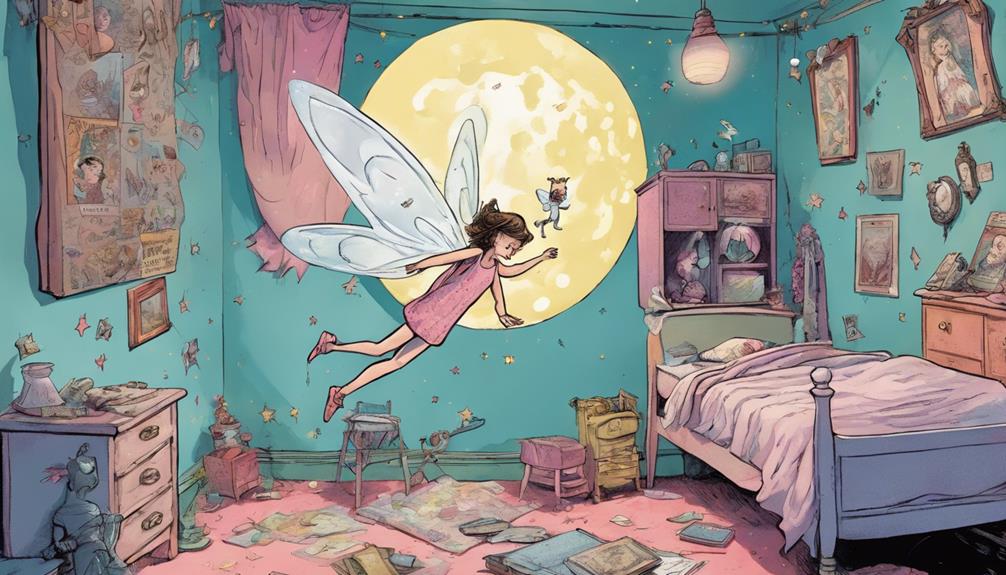
Reflecting on the Tooth Fairy traditions reveals how these whimsical practices shape children's perceptions of loss and reward. You might notice that the excitement of losing a tooth can be intertwined with lessons on honesty, competition, and expectations.
Consider these key aspects:
- Payout Variability: The amount left under pillows can vary widely, influencing how children value their lost teeth.
- Self-Pulled Teeth: Families often decide against rewarding self-pulled teeth, as it can lessen the magic of the tradition.
- Sock Market: Kids discussing the 'sock market' can create competition, impacting how they perceive their friends' Tooth Fairy experiences.
As you engage with these traditions, it's crucial to foster a sense of integrity. When children try to deceive the Tooth Fairy, they may face consequences that highlight the importance of honesty.
Ultimately, these practices not only mark a rite of passage but also serve as a platform for teaching valuable life lessons.
Frequently Asked Questions
How to Answer Is the Tooth Fairy Real?
When your child asks if the Tooth Fairy's real, encourage their imagination. Ask them what they think! This keeps the magic alive while gently introducing them to the idea of reality and belief.
How to Explain Why the Tooth Fairy Didn't Come?
If the Tooth Fairy didn't come, it's likely because your tooth wasn't in a visible spot, she got busy, or maybe she wanted to teach you patience. Don't worry; she'll be back soon!
What to Say When the Tooth Fairy Forgot?
When the Tooth Fairy forgets, remind your child that she gets busy too. Encourage them to leave a note, and celebrate the lost tooth together. It's all part of the magical experience!
Is 11 Too Old to Believe in Tooth Fairy?
It really depends on you and your family. If you enjoy the magic and wonder, there's no harm in believing at 11. Everyone matures differently, and imagination can be a beautiful part of childhood.
Conclusion
In wrapping up the Tooth Fairy's journey, it's clear she wishes for a more thoughtful approach to her generosity.
Did you know that 62% of kids feel disappointed when they don't get the amount they expect for their lost teeth? This highlights the importance of communication and setting realistic expectations.
By encouraging honesty and fostering sharing among siblings, the Tooth Fairy can guarantee that her magic remains a joyful experience, rather than a source of rivalry or regret.





